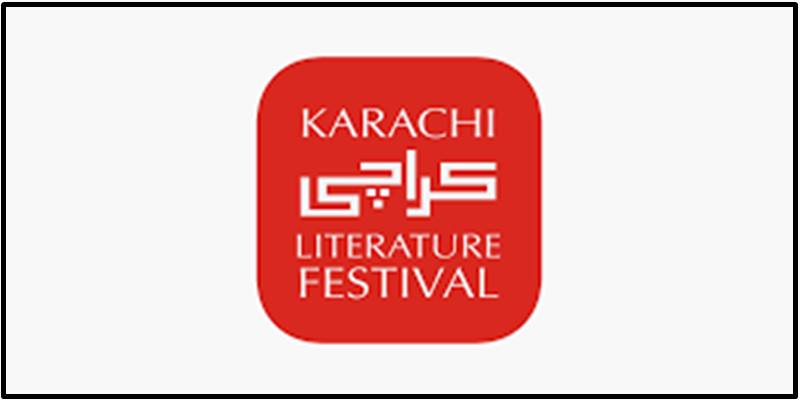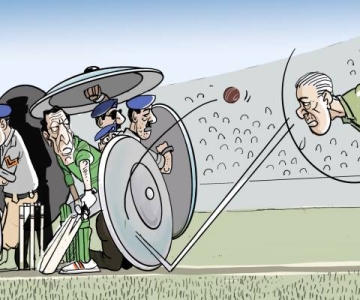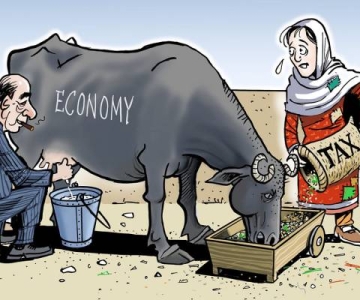Ghazi Salahuddin’s write up for the NEWS makes interesting points about the festival and also mentions me as one lost between the English and Urdu worlds
Far from the unruly crowds we watch on our news channels, playing hide and seek with an equally enraged and rowdy police, a select group of book lovers was able to retreat, during the last weekend, to the wonderland of literature. This, of course, was the Karachi Literature Festival sponsored by the Oxford University Press and the British Council. And all of us who were there were grateful for a memorable experience.
The two-day festival was held at a hotel tucked into a corner in Defence, by the side of the creek. It also bills itself as a resort. In that sense, being there did enforce a sense of distance from the disarray that pervades our daily existence. It was, thus, a lot of fun, and real pleasure was derived from casual encounters that flourished on the sidelines, with so many distinguished Pakistani writers and poets in attendance.
Now, when I underline this manifestly elitist aspect of the festival, I am not being critical of how it was designed. In fact, the location made the festival possible in spite of security concerns and the overall ambience greatly facilitated the discourse on otherwise rather sombre issues. Besides, the balance in the audience did tilt towards the readers of English and they could find easy access to the location. This is what would be expected of an event organised by the OUP and the British Council.
At the same time, any festival of literature in Karachi should legitimately have a larger focus on Urdu – and Sindhi, in a wider context. Here, we had an impressive galaxy of Urdu writers and poets to share the spotlight with English authors and critics. But the two worlds did not seem to provide a meaningful confluence of interest and involvement. I found further evidence of how the clientele of Urdu may be shrinking and how the educated Pakistanis are drifting away from what is supposed to be their national language.
This is an issue that I find very disturbing. However, let me first try to provide a glimpse of what the Karachi Literature Festival was all about. It consisted of panel discussions, book launches and readings by writers and poets. There was a workshop on creative writing – yes, in English. Also, a ‘mushaira’. Invitees were treated to a ballet performance and a play, in Urdu, performed by Sheema Kermani and her group at the Arts Council.
Writing about the festival, one is expected to list the names of its major participants. This would be difficult for me, unless I copy the entire programme and that would leave little space for comment. The organisers had succeeded in bringing together a very impressive collection of our creative writers. In the Urdu corner, we had such luminaries as Shamsur Rahman Faruqi (from India), Intizar Husain, Iftikhar Arif, Zehra Nigah, Fehmida Riaz, Kishwar Naheed, Masood Ashar, Arfa Syeda Zehra and Fatima Hasan.
English writers included Mohsin Hamid, Mohammad Hanif, Bapsi Sidhwa, Zulfikar Ghose, Aamer Hussain, Musharraf Ali Forooqi, Maniza Naqvi, Husain Naqvi, and Sehba Sarwar. And there were some who straddled the two worlds, such as Asif Farrukhi, Harris Khalique and Raza Rumi. I would consider myself in this category, knowing that this ability to find gratification in both Urdu and English literature is pronouncedly getting scarce.
On both days, events were held simultaneously in two separate rooms. You had to make your choice. This is how it is in large literary functions. In fact, a lot more activities would be justified to cater to a variegated audience. However, I was worried about the linguistic division in the two channels. On the face of it, putting, say, Mohsin Hamid and Fehmida Riaz in separate rooms at the same time would seem justifiable. But in my view, one important purpose of a festival of this kind should have been to expose the readers of one language to the glory of the other.
When I agonise over the overwhelming dominance of English in our society and its impact on the reach and influence of Urdu literature, I do not want to suggest that the British Council and the OUP have any responsibility to defend the cause of Urdu and the intellectual emancipation of our largely illiterate country. This is something that our rulers and opinion leaders have to think about.
This is not the occasion for me to reiterate my strongly held view that English, though necessary as a second language, is becoming a formidable barrier to our progress. It is the only means to social and economic empowerment and intellectual enlightenment. With reference to literature, let me only refer to a piece I recently wrote for a National Book Foundation publication: ‘A tale of two novels’.
The point I made was that a truly impressive Urdu novel does not sell as many copies in Pakistan as another, equally remarkable English novel by a Pakistani writer. To be specific, I made a reference to ‘Ghulam Bagh’ by Mirza Athar Beg and ‘A Case of Exploding Mangoes’ by Mohammed Hanif. What percentage of our population you think would go for serious English literature, not ignoring the poor quality of English that is taught in our institutions? And what does it mean when even this thin slice is bigger than the readership of Urdu literature?
Indeed, I find it heartbreaking that almost all the bright young people, who distinguish themselves in their professions, have little grounding in Urdu literature. They do not know what a terrible loss it is to be deprived of the enchantment of Urdu poetry.
The festival brochure correctly pointed out that “there is currently a huge interest around the world in writing from Pakistan, and established and emerging Pakistani writers have received great attention and critical acclaim internationally, as well as at home”. Needless to say, they write in English. But the world they inhabit is not the world in which Pakistan, as a country, is struggling to survive at one hundred and forty-fourth place in the latest Human Development Index of the UNDP.
Irrespective of all this, I am convinced that the Karachi Literature Festival made a positive contribution to the cultural and literary environment of the city. It was so successful that the organisers have already started planning for the next year – and the year after that. I hope that next year, a concerted effort is made to attract a larger, middle-class audience from across the English-Urdu divide.
A number of very pertinent issues were taken up in last week’s deliberations. They discussed literature and activism and, in another panel discussion, sufism and literature. Different ideas and assessments emerged in every session. In a gathering of such gifted minds, the quality of discourse is sure to be high. As for the language issue that is so crucial to Pakistan, perhaps they can take it up next year.



